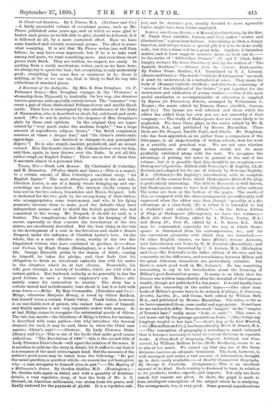TALES, Exc.—Truth with Honour. By Christabel R. Coleridge and M.
Bramston. (Walter Smith and Innes.)—This is a sequel, to a certain extent, of Miss Coleridge's excellent story, "An English Squire." The most attractive person in the new tale, Cheriton Lester, is one of a family whose bringing-up and sur- roundings are there described. The interest chiefly centres in him and in the two sisters, Guendolen and Maisie Despard. Life is darkened for the two girls by the wrong-doing of their father, who misappropriates some trust-money, and who in his dying moments entreats them to make good the default—they have independent means—and to shield the foolish partner who had consented to the wrong. Mr. Despard, it should be said, is a banker. The complications that follow on the keeping of this secret, especially as they concern the love-history of the two sisters, are excellently described. But the best thing in the tale is the development of a soul in the frivolous and shallcw Maisie Despard, under the influence of Chariton Lester's love. On the whole, this is a most effective story, worthy of the two dis- tinguished writers who have combined to produce it. —Inno- cent Victims, by Hugh Donne (Remington), is a tale of London life. George Elsworth yields to the demon of drink; coming to himself, he takes the pledge, and then finds that his obligation to drink no intoxicant embroils him with his mates in the situation which he at last obtains. Meanwhile, his wife goes through a variety of troubles, which are told with a certain pathos. Her husband, unlucky as he generally is, has the good fortune to save a former employer's son. Hence ulti- mately comes his restoration to society. The story has a certain unreal and melodramatic tone about it, but it is told with some force.—Midge. By May Crommelin. (Trischler and Co.)— Midge, otherwise Marjorie Honey, is loved by Oliver Baldock, but herself loves a certain Frank Oxley. Frank Oxley, however, is an unreliable sort of person, who cannot take care of himself, and finally marries a not very reputable widow with money. So at last Midge comes to recognise the substantial merits of Oliver. The tale has merits—the blindness of Midge's father, for instance, is described with some pathos—but why introduce the farcical element, for such, it may be said, there is, when the blind man marries Oliver's aunt P—G/oriana. By Lady Florence Dixie. (Henry and Co.)—This is one of the books that make good causes ridiculous. "The Revolution of 1900"—this is the second title of Lady Florence Dixie's book—will upset the relation of the sexes. It is needless to criticise the story in detail; let it suffice to say that it
is a romance of the most extravagant kind. But the measure of the author's good sense may be taken from the• following : "He put the usual question, a question which—no reason has yet been given
why—a man arrogates to himself alone to put."—The Mystery of a Millionaire's Grave. By Gordon Stables, M.D. (Remington.)— Dr. Stables tells again in detail, and with a quantity of fictitious details, a very repulsive story, of how the body of Mr. A. T. Stewart, an American millionaire, was stolen from the grave, and finally restored for the payment of £5,000. It is a repulsive sub-
ject, and Dr. Stables's pen, usually devoted to more agreeable topics, might have been better employed.


































 Previous page
Previous page